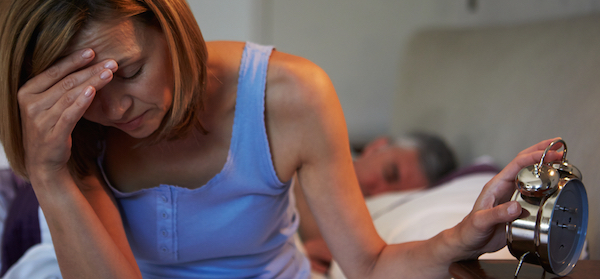Did you know that driving after being awake for 24 hours means you are seven times more likely to have an accident? Not getting a good night’s sleep can leave you feeling exhausted, irritable and accident-prone. But don’t worry, you are not alone.
A recent study estimated that nine per cent of Australians, that’s 1.5 million people, currently suffer from some type of sleep disorder. Each year the economic impact of this is an estimated $5.1 billion in lost productivity, accidents and absenteeism.
Insomnia is a very common sleep disorder, which is the inability to fall asleep or to stay asleep. It affects anywhere between 13–33 per cent of us, with women being twice as likely to suffer from it compared to men. Middle-aged women in particular may find that their menopause brings years of broken sleep.
What causes insomnia?
There are numerous causes for insomnia: a new baby, shift work, anxiety, chronic pain, caffeine, eating late, sleep apnoea, snoring, menopause or simply not being able to switch off your mind.
While many cases of acute insomnia are due to a particular event, and are temporary, chronic insomnia can be ongoing and have a huge impact on your health and wellbeing. Long-term sleep deficiency has been linked to a higher risk of depression, cardiovascular disease, Alzheimer’s disease, obesity, type 2 diabetes, high blood pressure and reduced immunity.
Jean Hailes psychologist Dr Mandy Deeks says, “When you don’t get enough sleep you are more likely to be grumpy, anger easily, find it hard to think clearly and then you can start making mistakes. This can start a negative cycle as you lie awake stressed and anxious about what you said or did during the day because you were short-tempered and you were still tired from lack of sleep the night before.”
Sometimes it is difficult to know what comes first, insomnia or depression, says Dr Deeks. “One of the symptoms of depression is insomnia, and one of the side effects of chronic insomnia is depression and anxiety. If this is happening for you, please see your doctor to talk about your symptoms.”
Beating insomnia
If you are suffering from insomnia, don’t despair, there are numerous ways to try and resolve the condition. Keeping a sleep diary for a week will help you work out how often you are waking. Take this information to your doctor so you can discuss a plan of action together.
Create a new routine: Eat at least two hours before bedtime, don’t drink caffeine after lunchtime, reduce your alcohol intake, get regular exercise but not in the four hours before bed, switch off your computer or smartphone, and keep the bedroom lights dim.
Going to bed and getting up at the same time each day will help reset your body clock. If you are lying in bed unable to sleep, get up, keep the lights dim and do something relaxing.
Mindfulness: This meditative practice is being used worldwide to help people deal with anxiety and to relax. It teaches you to be present in the moment without allowing negative thoughts to stress you out. Simply focus on your breathing, acknowledge thoughts as they appear but don’t dwell on them. Visit the Jean Hailes website to listen to a podcast on mindfulness.
Counselling: If your insomnia is due to anxiety or depression, a counsellor can help you talk through the issues behind your feelings.
Medicines: Acute or short-term insomnia can often be remedied with a short course of sleep medicines, but these are highly addictive and can only be used for a few weeks.
For more information on how to get a good night’s sleep, visit Jean Hailes.
Published with the permission of Jean Hailes for Women’s Health
1800 JEAN HAILES (532 642)

